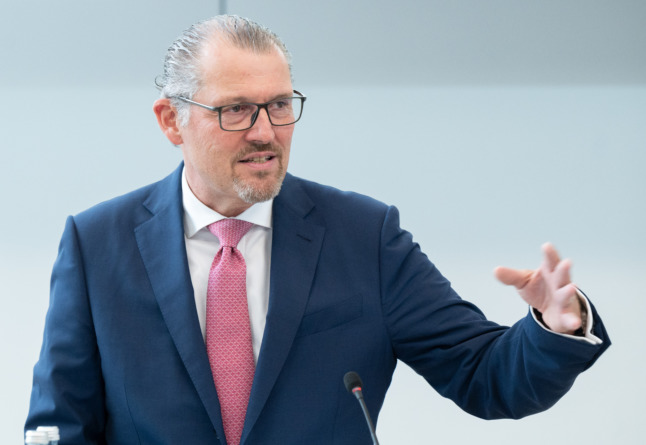Speaking to DPA on Thursday, Rainer Dulger, president of the Confederation of German Employers’ Associations (BDA), said the issue wasn’t with raising the minimum wage, but rather with the route chosen to get there.
“The way it is being proposed by the federal government at the moment, it is a gross violation of collective bargaining autonomy,” he said.
On the same day that Olaf Scholz (SPD) was sworn in as chancellor, Labour Minister Hubertus Heil announced plans to rapidly introduce a bill that would see the minimum wage hiked up from €9.60 to €12 by the end of 2022.
The pledge to raise wages for the lowest earners was a key electoral promise for the centre-left SPD, and Scholz has claimed that the move will benefit around 10 million people.
READ ALSO: Wages, rent and pensions: What will the new German government mean for your wallet?
But critics from the BDA say that the government is breaking a promise to leave the Minimum Wage Commission in charge of changes to employees’ pay packets.
“In the short term, it is not about the €12, but about how the new federal government deals with the minimum wage commission and with collective bargaining autonomy,” Dulger said. “The minimum wage as a plaything of politics is the last thing our social partnership needs.”
Since the minimum wage was first introduced in Germany in 2015, representatives of business owners and employees have been tasked with setting increases as part of the Minimum Wage Commission.
Dulger said there was a danger that this would lose all meaning if every future government was able to simply set the rate it wanted and then “reinstate” the commission afterwards.
“Whether, when and how we will have a qualified legal review of the federal government’s action depends entirely on when this political minimum wage is to be enforced,” he said. “The autonomy of collective bargaining is constitutionally protected.”

Hans Peter Wollseifer, president of the Skilled Trades Association, expressed a similar view.
“If the minimum wage of €12 were to come in as early as 2022, it would make around 200 collective agreements obsolete that had been negotiated between the social partners – i.e. employers and trade unions,” Wollseifer told DPA. “The only conceivable way out of this dilemma is to set the 12 euros as a target – but not for 2022.”
With the minimum wage already set to increase by €10.45 by July 1st, Wollseiter said he thought the target of €12 could be reached by the end of 2023 without government intervention.
READ ALSO: KEY POINTS: Germany’s next government unveils coalition pact
‘Common interest’
On the trade unions’ side, workers’ representatives have said they are keen to find a solution to raising the minimum wage that doesn’t undermine the Minimum Wage Commission.
“We have a common interest in not calling into question the functioning of the minimum wage commission,” Dieter Hoffmann, the president of the Confederation of Trade Unions (DGB) told DPA. “It should be possible to find a common solution on how to reach the €12 quickly.”
Once the target of €12 is reached, the previous mechanisms for setting wages should continue to exist, Hoffmann said.
“At the same time, it is clear to the trade unions that the minimum wage is always only the second-best solution – after a strong collective bargaining relationship with good collective wages,” he added.
In their coalition agreement, the SPD, Greens and FDP promised that the commission would continue to set future increases after the one-time adjustment to the minimum wage – a promise that was reiterated by Hubertus Heil in a recent interview with the Rheinische Post.
Vocabulary
to consider – erwägen
Minimum wage increase – (die) Mindestlohn-Erhöhung
Employer – (der) Arbeitgeber
to reinstate – wieder einsetzen
We’re aiming to help our readers improve their German by translating vocabulary from some of our news stories. Did you find this article useful? Let us know.




 Please whitelist us to continue reading.
Please whitelist us to continue reading.
Member comments